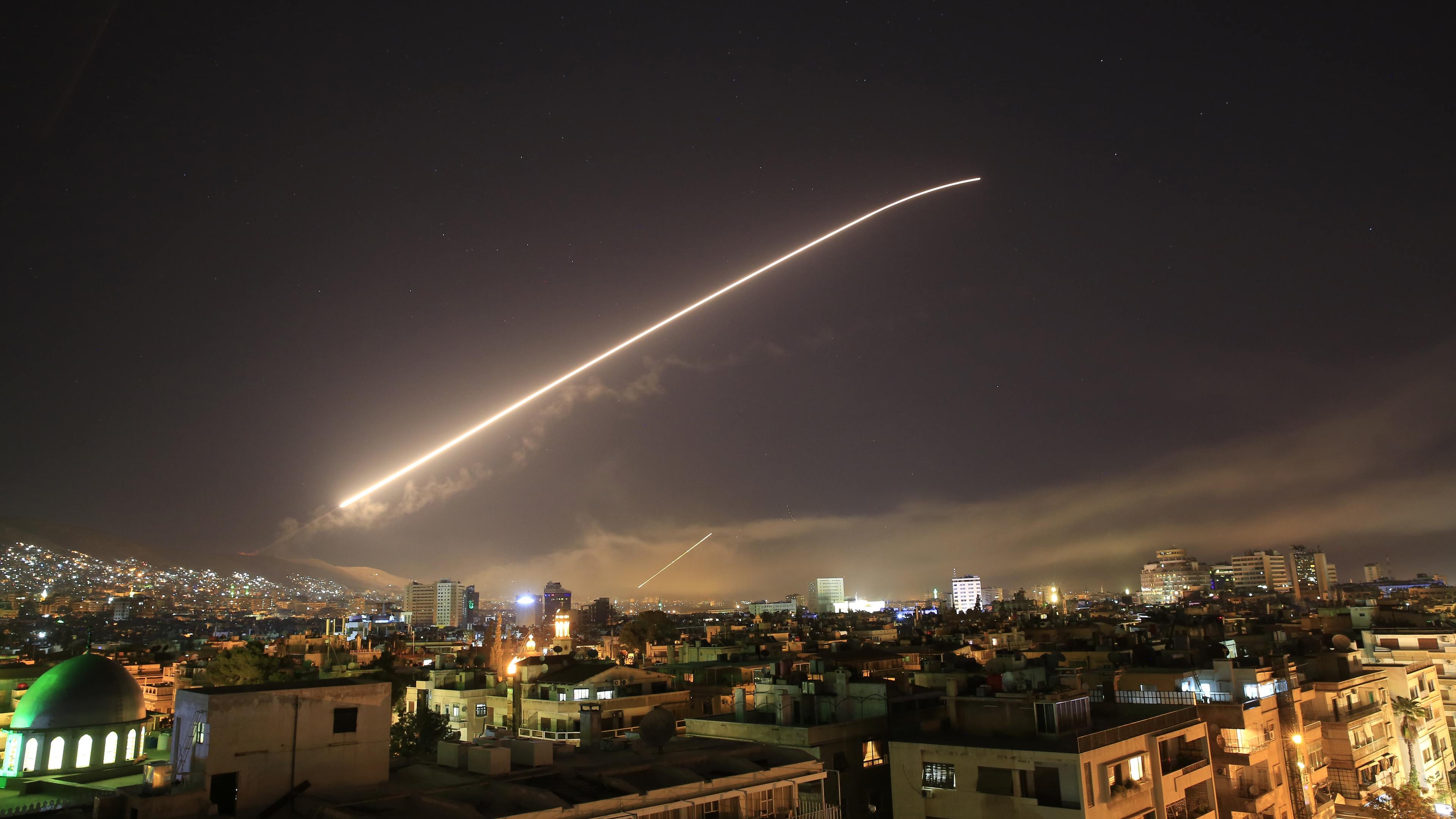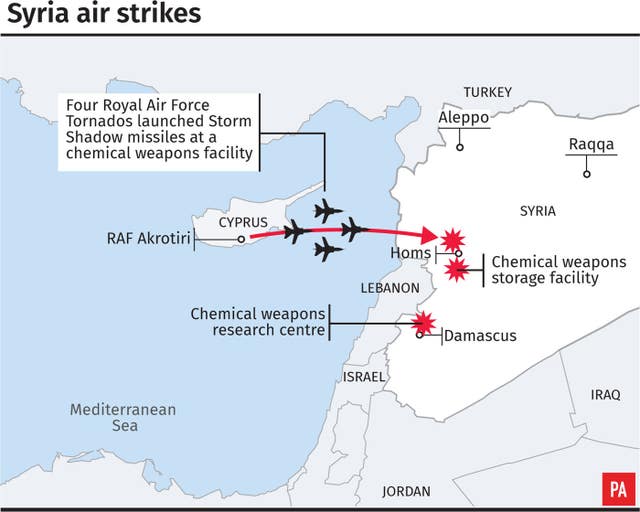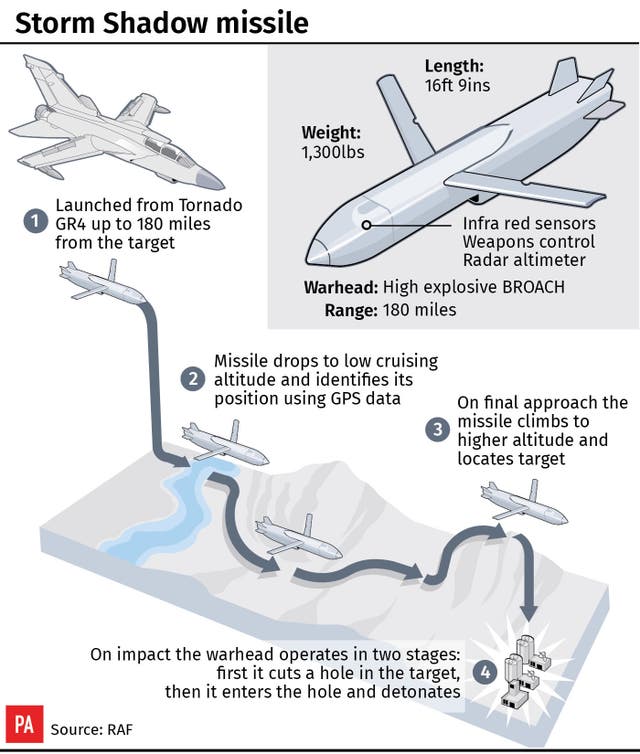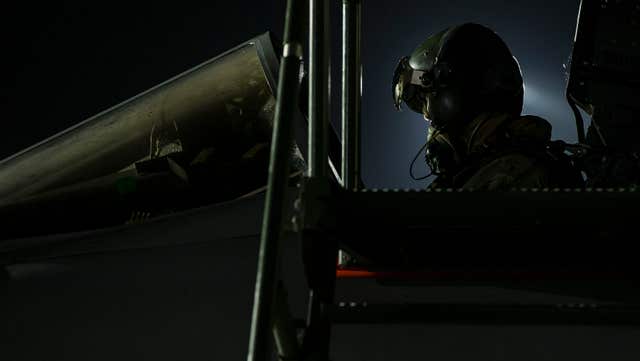A SERIES of missile strikes have been launched against Syria by the US, UK and France – as Russia warned that the allies’ intervention “will not be left without consequences”.
Three waves of overnight strikes destroyed important infrastructure at sites connected with the Syrian regime’s chemical weapons programme.

British Tornado GR4s departed from RAF Akrotiri in Cyprus and fired Storm Shadow missiles at a military facility near Homs, where the regime is said to have kept chemical weapon precursors.
Other sites near Damascus were also targeted in the assault which US Defence Secretary Jim Mattis called a “one-time shot”.
Nato secretary-general Jens Stoltenberg is among those to have backed the intervention – saying “the use of chemical weapons is unacceptable, and those responsible must be held accountable” – while the Russian ambassador in Washington, Anatoly Antonov, said: “We are being threatened. We warned that such actions will not be left without consequences.”
Syria airstrikes: Nicola Sturgeon says foreign policy should be set by Parliament not US President
Syria’s main backer, Russia, which has insisted there was no chemical weapons attack in Douma and accused the West of fabricating evidence of it, was not informed of the strikes in advance, according to the US.
However, French Defence Minister Florence Parly said the Russians were warned “ahead of time”.
The strikes were met with limited resistance in the form of Syrian surface-to-air missiles and the country’s state TV said three civilians were wounded near the military base in Homs. There were no reports of any allied losses during the strikes.
Announcing the operation, Prime Minister Theresa May said there was “no practicable alternative to the use of force”.
The Prime Minister @theresa_may has made a statement on Syria: https://t.co/bBfYyowUIo pic.twitter.com/QlTeFXmOkt
— UK Prime Minister (@10DowningStreet) April 14, 2018
Mrs May said “every possible diplomatic channel” had been explored before authorising the strikes, adding that it was not a decision she had taken lightly.
She said: “This persistent pattern of behaviour must be stopped – not just to protect innocent people in Syria from the horrific deaths and casualties caused by chemical weapons but also because we cannot allow the erosion of the international norm that prevents the use of these weapons.
“This is not about intervening in a civil war. It is not about regime change.”
US President Donald Trump said the Syrian regime’s use of chemical weapons on Douma last Saturday was a “significant escalation in a pattern of chemical weapons use by that very terrible regime”.
Giving a statement at the White House, Mr Trump said: “This evil and despicable act left mothers and fathers, infants and children thrashing in pain and gasping for air.
“The combined American, British and French response will integrate all instruments of our national power.”
Mrs May said the action would also send a “clear signal” to anyone else who believed they could use chemical weapons “with impunity”.
She said: “This is the first time as Prime Minister that I have had to take the decision to commit our armed forces in combat – and it is not a decision I have taken lightly.”
Mrs May authorised the strikes despite demands from opposition parties that Parliament was consulted before any military action was launched.
The PM has engaged UK forces in gesture bombing, with no major international consensus and no long term plan to halt the use of chemical weapons or deliver peace. Most worrying, is that she has acted at the behest of presidential tweets and sidelined parliament. https://t.co/GVv2PkEHiM
— Stewart McDonald MP (@StewartMcDonald) April 14, 2018
Stewart McDonald, the SNP spokesman for defence, said joining in an allied attack on Syria was “not a brave or strong” decision by Mrs May.
He wrote on Twitter: “The PM has engaged UK forces in gesture bombing, with no major international consensus and no long term plan to halt the use of chemical weapons or deliver peace.
“Most worrying is that she has acted at the behest of presidential tweets and sidelined Parliament.”
Dozens of men, women and children were massacred using chemical weapons in Douma on Saturday, 7 April.
The red line has been crossed.
I have therefore ordered the French armed forces to intervene.https://t.co/mezFfV1Hh9 pic.twitter.com/7lVhMjhx9I— Emmanuel Macron (@EmmanuelMacron) April 14, 2018
French President Emmanuel Macron said there was no doubt the Syrian regime was responsible for the chemical attack in Douma.
“The red line set by France in May 2017 has been crossed,” he added.
General Joseph Dunford, chairman of the US Joint Chiefs of Staff, told reporters at a Pentagon briefing that the first of the allied strikes on Saturday was at a scientific research centre in greater Damascus involved in the development and production of chemical weapons.
The second was at a chemical weapons storage facility west of Homs, while the third was at a chemical equipment storage facility and important command post.
He added: “Important infrastructure was destroyed which will result in a setback for the Syrian regime. They will lose years of research and development, storage and equipment.”
General Dunford said the strike had inflicted maximum damage without unnecessary risk to civilians.
Asked if the US and its allies would continue military operations, he said: “That will depend on Mr Assad should he decide to use more chemical weapons in the future, and of course the powers that have signed the Chemical Weapons Prohibition (Organisation for the Prohibition of Chemical Weapons) have every reason to challenge Assad should he choose to violate that.
“But right now this is a one-time shot and I believe that it sent a very strong message to dissuade him, to deter him from doing this again.”
Mr Mattis said the US remained in “close consultation” with its allies, adding: “We review the evidence all the time. But right now we have no additional attacks planned.”

Enjoy the convenience of having The Sunday Post delivered as a digital ePaper straight to your smartphone, tablet or computer.
Subscribe for only £5.49 a month and enjoy all the benefits of the printed paper as a digital replica.
Subscribe



